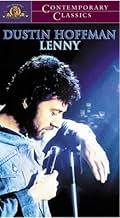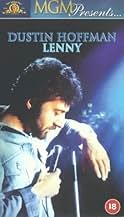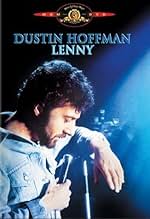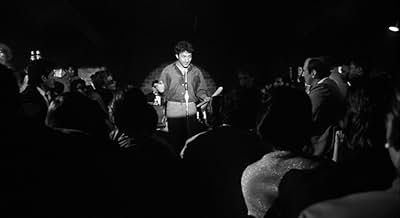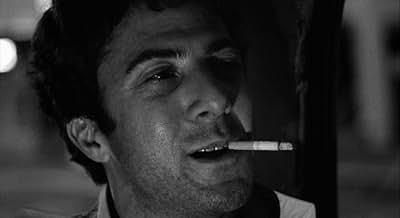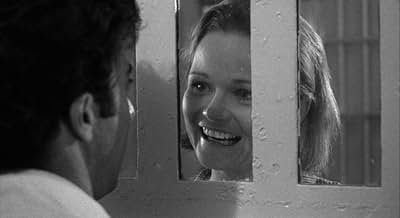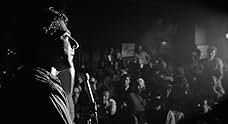Füge eine Handlung in deiner Sprache hinzuThe story of acerbic 1960s comic Lenny Bruce, whose groundbreaking, no-holds-barred style and social commentary was often deemed by the Establishment as too obscene for the public.The story of acerbic 1960s comic Lenny Bruce, whose groundbreaking, no-holds-barred style and social commentary was often deemed by the Establishment as too obscene for the public.The story of acerbic 1960s comic Lenny Bruce, whose groundbreaking, no-holds-barred style and social commentary was often deemed by the Establishment as too obscene for the public.
- Für 6 Oscars nominiert
- 7 Gewinne & 17 Nominierungen insgesamt
- Girl
- (as Kathie Witt)
- Hawaiian Judge
- (as Monroe Meyers)
Empfohlene Bewertungen
For it's time, the idea of doing this was shocking and wildly controversial. People saw him as vulgar and offensive, when he was really just speaking the truth that people were afraid to here. He evolved the game and it's only fair that an actor like Dustin Hoffman, a fellow pioneer of his career field, was selected to portray Bruce in this stark and honest biographic tale. My general stance towards Hollywood biopics is that I'm strongly against them, believing that to condense the life of a human being into a two or three hour film is impossible, but the script here by Julian Barry, adapting from his own play, does a strong job of taking the important parts of Bruce's life and leaving the rest behind.
Unfortunately it does fall into a lazy trap of this genre, using a structure that functions around post-death interviews with those closest to Bruce in order to tell the story of his rise and fall. What's interesting though is that it doesn't play it straight in the sense of going back and forth between post-death and the chronological rise of Bruce; it does do this, but it also throws in another period, Bruce's last routine on stage. This adds an interesting twist onto this worn out structure and makes watching his rise even more intriguing to witness.
We see him on stage, miraculously portrayed by Hoffman, with a full beard, exhausted expression and a wild, kinetic energy; a refusal to give up and sit down, an almost desperate need to get out all of the words he needs to say before he is stopped again. Bruce is almost a protester here, grabbing his microphone and shouting towards anyone who will listen to understand the crimes against humanity that are being permitted every day. Seeing him in this state makes it even more interesting to see where he began, as we now must wonder what happens to turn the nebbish and soft Bruce we meet in his earliest time period into the biting and confident man he will later become.
Bob Fosse directs it all with his own unique flare, and some razor-sharp editing keeps things feeling fresh and as kinetic as the man the whole thing is based around. I also want to mention the cinematography, which is honestly some of the best I've ever come across. It's presented in black and white, which was a wonderful idea to match Bruce's style as a performer, and the way that the shots are composed and lit is a visual orgasm in every way. This is one of those films that I wanted to pause every five seconds just to marvel at the way it was shot, but I couldn't allow myself to step away from seeing more of Bruce.
Everyone in the cast and crew do marvelous work here, but there's no denying that the film belongs to one man and that man is Dustin Hoffman. His performance is one of titanic proportions here, a slow-burn of pure genius, bringing Bruce along that evolutionary path to the man we know he will one day become. Lenny Bruce goes through many stages before he becomes the comedic icon that we initially see, and Hoffman plays them all with an absorbed authenticity that is purely magical. Looking back in time we see when he first meets his future wife Honey, and the utter bliss and childish joy on his face would be beautiful if it wasn't so heartbreaking knowing what he will eventually become.
It's in the later stages that Hoffman truly lifts off though, when Bruce is in and out of prison and struggling with a drug addiction. Bruce becomes a bastion for free speech and social commentary, but more the film presents him as something more human than that; a flawed creature who for all of his evolutionary changes to media was also a very broken man within himself. There is a scene where Bruce does a routine wearing nothing but a raincoat and one sock, while he's riding high on drugs, that might just be the finest piece of acting I've seen my entire life.
The scene is about ten minutes long, but it feels like it lasts an eternity. Normally this would be a complaint, but here it couldn't be a stronger compliment, as Hoffman takes us through this horrific state that the man is in at the time. With his lapses in silence, his rambling dialogues and his stop and start speech patterns, it's like watching a train wreck that you can't stare away from and you just keep hoping will be over soon. You want it to stop but you know that you aren't going to look away until it does.
This colossal feat of acting would be impressive on it's own, but the fact that Hoffman does all of it in one take makes it something truly out of this world. It's a performance that stands at the very top of the all-time greats, in a film that is as brutally honest towards Lenny Bruce as he was towards the rest of the world.
He was infamously arrested over a dozen or so times for speaking offensively in comedy clubs, and eventually began to represent himself in court. He never gained respect when he was alive, and so he died a frustrated, misunderstood soul who was simply far too ahead of his time.
The masses didn't get him. His racial jokes and political satire was misinterpreted and taken at face value. His sermons ridiculing religion drew hate from conservative Americans.
But Bruce enjoyed toying with words, and bending the typical perception of what they symbolized he cherished the impact they had on people. When Bruce said a certain four-letter expletive, it wasn't to purposely offend people it was to help liberate their ways of thinking. Words were an entryway - once he could knock people off-balance, he was free to go for the throat. He used foul language in the same way as he used words dealing with religion, homosexuals, politics and the world he used them to make a point. And it's a shame his point didn't resonate until after his death.
The makers of "Lenny" understood Bruce, though. They also understood his flaws as a human being, and the result is an unflinchingly honest biopic that paints a dark, staunch portrait of a troubled man. Dustin Hoffman presents Lenny as an alternately despicable and heroic figure, and there is a spark in his eyes throughout the early scenes of the movie that eventually gives way to desperation later in the picture. Hoffman is so convincing we forget we are watching an actor. He entirely embodies himself within Lenny Bruce, adapting all of the comic's tics and habits.
The movie is told from the perspective of those who knew Bruce his wife, Honey (Valerie Perrine), his aunt, and his manager. The narrative cuts back and forth between scenes with Lenny and interview segments, which we see through the eyes of an off-screen interviewer (whose voice is none other than the movie's director, Bob Fosse).
"Lenny" is an uncomfortable film, and it is not by any means perfect. The matter-of-fact narrative is a bit alienating and prevents us from getting entirely close to Bruce but that may very well have been the point. A more heartfelt biography of the performer perhaps would have restricted Fosse and screenwriter Julian Barry from divulging into Lenny's more seedy character traits such as when he coerces his unwilling wife into a threesome with another woman, later ridiculing her for doing so; or when he goes on stage completely drugged out of his mind and makes a fool of himself. If they had allowed audiences to empathize with Bruce to a greater degree, truth may have been sacrificed along the way. And although the narrative is rather cold, it's also unique sometimes refreshingly so.
Despite imperfections, "Lenny" is one of the better motion pictures of the 1970s and perhaps one of the movies that best capture the essence of cinema from a time when the mainstream and art-house were coexistent.
It is a typical 1970s production insofar as that it is grim, bleak and more depressing than any production you would have seen on the screen a decade earlier but it's an admirable feat. Fosse has a close grip on the direction and Hoffman and Perrine are both absolutely superb, bringing to life two very tortured souls who temporarily found solace in each other, before finding their relationship put to the test by drug abuse and self-loathing.
Lenny died from a heroin overdose in 1966. In 2003 he was granted a posthumous pardon by New York State for his most notable arrest in 1964, for an "obscene performance." It's a nice gesture, although one can't help but think it would have only really made a difference 40 years ago.
**** (out of 4)
Bob Fosse's masterpiece takes a look at the short life of comic Lenny Bruce (Dustin Hoffman) who would die at the age of forty but not before breaking down certain doors for future comics. The film follows his rise up through the ranks thanks in large part to the controversy that followed him due to the nature of his act. I've always felt that LENNY was one of the best movies of the decade and even after all these years it's still a very sharp, at times funny but mostly sad look at a man who deserved much better than he ever got. There's no doubt in my mind that the film was like the light shining from above on both Fosse and Hoffman as the two were perfectly meant to bring this film to the screen and boy do they really deliver. Fosse's style here wouldn't work with most directors but the way he uses it to get to the emotion and power in the story is quite amazing. The film jumps back and forth through different periods of Bruce's life and the way Fosse uses this to build up the subject is something interesting to watch. Just take a look at a rather innocent scene where Bruce talks his wife into having a threesome with another woman. Just look at how the silence is used and the impact this has for this scene. Hoffman gives one of his greatest performances here, which is saying quite a bit considering how great he was during this period of his career. I thought he really did a remarkable job at not copying the real Lenny Bruce but instead taking him and forming him into this character. I thought Hoffman really gave an incredibly powerful and emotional performance and especially as Bruce begins to crack due to the pressures of the courts and the drugs. Valerie Perrine is also excellent in her role of Bruce's drug addicted wife. The B&W cinematography is some of the greatest you're ever going to see. This is certainly one of the most beautiful films you're ever going to see and especially the way the lighting is even in the simplest scenes. LENNY often gets beaten up by some critics because it's not 100% accurate but I've yet to see any bio pic that is. To me this is clearly one of the best movies of the decade and features one of the greatest performances you're going to see.
Lenny starts out trying to do bits like any other comic of the day - the early 50s, and he fails at it. He then starts to do more commentary on the human condition as stand-up, and that's where he hits his mark. Especially at a time of great societal change like the late 50s/early 60s. Today, that's the stuff of pretty much all stand-up comics, so it's hard to appreciate just how ground-breaking it was at the time. It's like trying to appreciate how ground-breaking "Citizen Kane" was in 1941. It's still an interesting film, but it's just impossible to appreciate it as next-level filmmaking like it was at the time.
My big takeaway was that director Bob Fosse really knows how to tell a story with editing. There are sequences in all of his movies where I would say, 'Wow,' just to an editing choice. Lenny impressed me the most in that regard. As for Valerie Perrine as Lenny's wife - I think that had she been up for Best Supporting Actress Oscar instead of Best Actress, she would have won that category. She was striking as a woman who went along with the choices that her husband made for the both of them with not much if any input from her, and later got blamed by him and society for that matter for going along with those choices. In that regard, she was a more conventional wife of the 1950s than you would think.
Wusstest du schon
- WissenswertesThe scene in which Lenny Bruce does his act in a raincoat, near the movie's end, came from a Lenny Bruce show that a student tape-recorded and sent to Dustin Hoffman. Bruce's lines are directly from the tape.
- PatzerDuring the movie's opening monologue, Lenny says that it's 1964 and then references Jerry Lewis's MDA Telethon, which debuted in 1966.
- Zitate
Lenny Bruce: What's the worst thing you can say to anybody? ''Fuck you, mister!'' That's really weird, because if l wanted to hurt you, l should say, ''Unfuck you, mister'' Because ''fuck you'' is really nice, man.
- VerbindungenFeatured in Precious Images (1986)
Top-Auswahl
- How long is Lenny?Powered by Alexa
Details
Box Office
- Budget
- 2.700.000 $ (geschätzt)
- Laufzeit
- 1 Std. 51 Min.(111 min)
- Farbe
- Sound-Mix
- Seitenverhältnis
- 1.85 : 1


